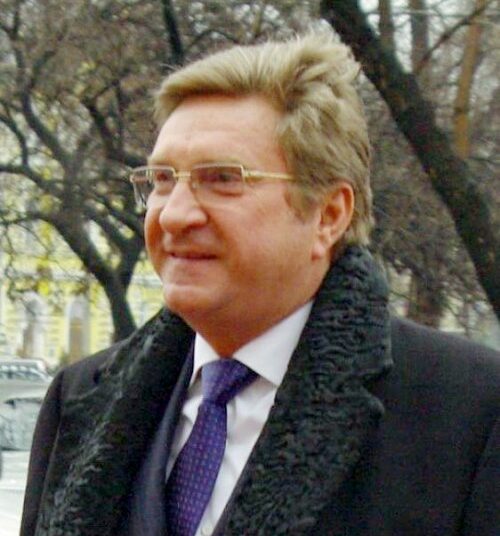Of all the Odessa family clans, the Urbanskys until recently remained the most inconspicuous, avoiding public politics and wide publicity of their activities. After all, their family had something to hide not only from Ukrainian journalists and the public, but also from international inspections fighting smuggling and embargo violations. Today they are trying to bury deep their secrets of the past and enter Ukrainian politics completely pure and innocent, as if after a bath. However, it is difficult to whitewash someone who is constantly smeared in new scandals.
There lived a brave captain Igor Urbansky
The name Urbanskikh has been known in Odessa for a long time, thanks to the scandalous father of the current chairman of the regional council, who created his own very influential family clan in the city – whose connections reach Kyiv, and whose business goes far beyond the borders of Ukraine. However, he was born Urbansky Igor Anatolievich in the distant Georgian town of Akhalkalaki, August 2, 1953, in the family of a KGB officer. Whether his father served in state security, or in the 38th Akhaltsikhe border detachment located there, Igor Urbansky never said. But it is known that his father then transferred to Kutaisi and rose to the rank of colonel, and had a great influence on his very obstinate son, who did not want to enter the prestigious MGIMO in his youth. Who knows what heights in career and business the agile and energetic diplomat Igor Urbansky could have achieved, but instead of a boring Moscow institute, he was drawn to maritime romance. In 1970, Urbansky ran away from his father to Odessa and entered the Higher Naval Engineering School (today it is the National University “Odessa Maritime Academy”).
However, even there young Igor proved himself to be such an antisocial element that he was once even expelled from school, after which he, not without the help of his influential father, had to recover again.
In addition, the brave cadet Urbansky hastened to get married, and on July 21, 1975, his first child was born: his son was named Anatoly in honor of his grandfather. As a result, his studies dragged on for six years, and only in 1976 did Igor Urbansky receive a diploma in the specialty “Navigation on sea routes”. His father helped him again and got his son a job in the merchant fleet of the USSR – where the queue of people wishing to sail abroad lined up for many years to come. For Igor Urbansky, this work became the most important school of life and the first step to big business – the basics of which he learned by bringing scarce wonders of imported consumer goods from abroad. As his career grew from third mate to ship captain, so did his opportunities in the shuttle trade. In Odessa, which became his home, Igor Urbansky acquired a lot of necessary connections with important people of that time: from port customs officers and city officials to black marketeers and criminal authorities.
In 1986, during the heyday of the illegal import trade, Igor Urbansky quit his prestigious and bread-and-butter job. The reason for this remained unknown, and only distant rumors say that he had some very serious problems with the law, which he could not solve even with all his connections. And then Igor Urbansky retrained from captains to cooperators: he bought an old river steamer, re-registered it as a “river-sea” class and, through his friends, registered it for charter to a foreign company. The ship began to transport goods from Turkey, and then domestic “shuttles”. Transportation turned out to be even more profitable than trade – and soon Urbansky similarly increased his personal fleet by several more ships.
It should be noted that such an “innovation” was a clear violation of all technical standards: often small river vessels are simply not suitable for the sea. In the 90s and 2000s, during the heyday of the shuttle business, several of these ships became the causes of tragedies: high waves covered them, washing passengers and cargo off the decks, and two overloaded ships capsized. But by that time, Igor Urbansky was already engaged in a much more profitable business.
Weapons Baron
In 1991-92 independent Georgia was shocked by the first coup, and its head became Eduard Shevardnadze, who over the next two years waged a civil war against supporters of the ousted Gamsakhurdia and the separatists of Abkhazia and South Ossetia. The war required a large amount of weapons, ammunition and ammunition, which Georgia could then buy in Ukraine and Moldova (including Transnistria). And here, as the media wrote, one of Igor Urbansky’s Kutaisi classmates, who became Shevardnadze’s bodyguard, recommended his childhood friend to him as a reliable person. And in 1992, Urbansky registered Evas LLC, which until 2001 was officially engaged in the supply of “consumer goods” to Georgia, and in addition to this, in 1992-93. transported weapons, ammunition, explosives and uniforms from military warehouses of the former Odessa Military District. This business was short-lived, but very profitable: the transportation of semi-legally sold weapons provides for very high “bonuses”, and in a few years Igor Urbansky will again take on a similar opportunity to earn money.
While the future Ukrainian oligarchs were still just looking at the factories, Igor Urbansky was already getting his hands on his main production assets – the ships of the collapsing Black Sea and Danube Shipping Companies. At the same time, it was not necessary to buy all the ships into ownership, making unnecessary expenses: often the ship was chartered and re-chartered, worked and generated income, but all the costs of its maintenance and repairs were borne by the owner (the state).
In 1994, Igor Urbansky registered the company “Kaalbye Ltd” in the offshore Isle of Man, which became the basis of his “Kaalbye empire”. Subsequently, Urbansky creates and registers several subsidiaries in the offshores of the Virgin Islands and Cyprus: Kaalbye Shipping International Ltd (1996) Kaalbye Oil Services (1997), Kaalbye Agency Services Limited, Kaalbye Shipping Cyprus, Kaalbye Marine Service”, “LLC Kaalbye Yacht”, then opening and heading their representative offices in Odessa. He also created the Panamanian holding Kaalbye Group Ltd – through which Kaalbye Transport Ltd and the Ukrainian Maritime Agency later emerged, opened JSC Epikor and JSC Epsilon, Panamanian Next Generation Finance and a number of other enterprises , also taken offshore under different schemes. By 2008, Urbanski’s cargo fleet consisted of 30 ships owned by his companies, plus he chartered ships from other shipowners as needed. Quite quickly, Kaalbye reached the international level, providing sea transportation with large-capacity vessels, and in addition providing various additional services – even providing trained crews for oligarchs’ yachts.
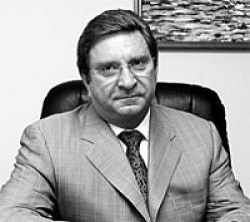 However, from time to time Igor Urbansky was drawn to the old things – that is, to the arms trade. It was difficult to avoid this temptation, since it was through the Odessa ports that legal, semi-legal and illegal sales of Ukrainian and Russian weapons were carried out around the world, and Urbankiy’s transport companies simply could not stay away from such profitable deals. And from time to time his name surfaced in scandalous stories. Thus, on February 24, 2001, in the port of Las Palmas (Canary Islands, Spain), the ship Anastasia, chartered by Kaalbye Shipping from a Georgian company (and sailing under the Georgian flag), was detained. On board were found 636 tons of weapons and ammunition, declared as “auto parts”, which were sold by the Rosvooruzheniye company to the Angolan company Simportex.
However, from time to time Igor Urbansky was drawn to the old things – that is, to the arms trade. It was difficult to avoid this temptation, since it was through the Odessa ports that legal, semi-legal and illegal sales of Ukrainian and Russian weapons were carried out around the world, and Urbankiy’s transport companies simply could not stay away from such profitable deals. And from time to time his name surfaced in scandalous stories. Thus, on February 24, 2001, in the port of Las Palmas (Canary Islands, Spain), the ship Anastasia, chartered by Kaalbye Shipping from a Georgian company (and sailing under the Georgian flag), was detained. On board were found 636 tons of weapons and ammunition, declared as “auto parts”, which were sold by the Rosvooruzheniye company to the Angolan company Simportex.
In the same year, Urbansky’s company participated in the controversial sale of X-55 cruise missiles to Iran. The scandal erupted because these missiles were carriers of nuclear weapons and should have been destroyed by Ukraine according to the disarmament treaty, but 20 units were “lying in warehouses.” Then they were written off “due to the end of their storage period,” and the missiles fell into the hands of the Progress company, which, through intermediaries, sold 12 missiles to Iran and 8 to China, using the services of Kaalbye Shipping for transportation. However, Igor Urbansky again came out of this scandal unscathed, but the officials and businessmen associated with him were less fortunate. It was reported that during 2002-2006. Several of Urbansky’s accomplices in the arms business passed away to the next world: former Ukrspetsexport Valery Maleev (March 2002, car accident), Iranian-Austrian businessman Haider Sarfraz (January 2004, car accident), Ukrainian businessman Sergei Petrov (January 2004, blown up in his car) , Russian businessman Sergei Orlov (January 2006, placed in a mental hospital, where he immediately suffered a stroke).
Igor Urbansky: Rockets for Chavez and shells for Assad
On September 25, 2008, the cargo ship Faina with a Ukrainian crew and Ukrainian cargo was captured by Somali pirates off the coast of Kenya. On board are 33 T-72M1 tanks, 6 BM-21 Grad installations, 150 sets of RPG-7V grenade launchers, anti-aircraft machine gun installations, ammunition and dynamic protection systems for armored vehicles. Officially, these weapons were supplied by Ukraine to Kenya under an official contract, but suspicion arose that the cargo was actually destined for civil war-ridden Sudan, which was subject to a UN arms embargo. The seizure of the ship attracted the attention of the world community, warships of other countries arrived in the region, and it was then that the captain of the American destroyer Howard, Jane Campbell, stated the following: “the cargo ship Faina, flying the flag of Belize, is owned and operated by Kaalbye Shipping Ukraine.” However, the company did not confirm this information, and its owner Igor Urbansky, who has worked as Deputy Minister of Transport of Ukraine Joseph Vinsky since December 2007, began to categorically refute it – claiming that the owner of the vessel is Israeli businessman Vadim Alperin (Read more about him in the article by Vadim Alperin. “King” of Odessa smuggling). He also swore that he had a purely casual “casual” acquaintance with Alperin, although later a source in the Ministry of Transport told about the existence of a joint business between Igor Urbansky and Vadim Alperin.
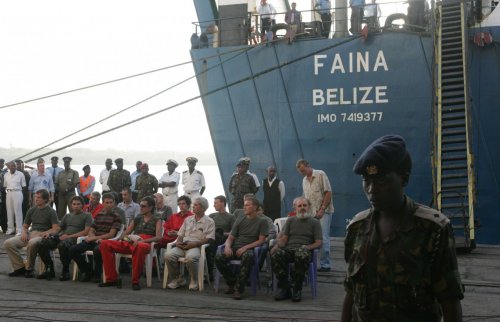
The ill-fated ship “Faina” after liberation
Unexpectedly, Joseph Vinsky rose to the defense of his deputy, declaring “… I asked Urbansky this myself, he reported that he had nothing to do with Faina.” Such a ridiculous justification in the style of “take our word for it” did not at all convince the Ukrainians, who were watching the developments with tension. And after the end of the epic, secret information appeared that negotiations with the pirates had dragged on for more than four months due to the shipowner, who was lowering the ransom amount. It also became known that in the period 2007-2009, Kaalbye participated in the arms trade together with the companies Tomex Team, Waterlux AG, Almar and Phoenix Trans-Servis.
Almost more than Ukrainian weapons, Igor Urbansky’s companies traded Russian ones—more precisely, they also transported them. It was possible to obtain lucrative contracts thanks to Boris Kogan, Urbankiy’s business partner, co-founder and director of Kaalbye Shipping Ukraine, who was also on the board of directors of the Russian company RT-Logistika. In turn, the owner of RT-Logistika (51% of shares) is the state holding Russian Technologies, Sergei Chemezov, a close acquaintance and confidant of Vladimir Putin (*criminal). Therefore, it is not surprising that, according to the American company C4ADS, in 2012 it was Kaalbye Shipping that was transporting S-300 anti-aircraft systems to Venezuela, sold by Russia (*country sponsor of terrorism) to Hugo Chavez under a contract worth $4 billion. However, this transaction was completely legal, unlike the next one.
In January 2013, 7 cargo ships belonging to the Kaalbye Shipping company, including the Ocean Voyager and Ocean Fortune, left the Ukrainian port of Oktyabrsk (Nikolaev) and headed to the Mediterranean Sea, where they then turned off their navigation instruments and “disappeared.” » out of sight of navigation services. According to C4ADS, this was how the supply of Russian weapons (armored vehicles, artillery, ammunition) to Syria for Assad’s army was organized – and this was already a violation of the international embargo. This traffic operated until mid-2013, until revealing publications appeared in the Western press, after which people in Kyiv made a surprised face and threw up their hands.
The most surprising thing is that the Kaalbye companies never received any scolding from the West. Moreover, “Kaalbye” continues, as if nothing had happened, to remain a contractor of the “US Military Sealift Command”, engaged in cargo transportation for the American fleet – that is, to successfully work on two fronts, serving strategic opponents.
Socialist Party of the Oligarchs
Igor Urbansky’s acquaintance with native Odessa resident Vasily Tsushko took place when the latter was a people’s deputy. But when in February 2005 Tsushko became chairman of the Odessa Regional State Administration, “the best people of the city” frequented his office – including Urbansky, who immediately joined the Socialist Party. Moreover, he provided the SPU with considerable financial support, thanks to which he was included in its electoral list (No. 37) in the 2006 elections and became a deputy of the Verkhovna Rada. There, Igor Urbansky became a member of the SPU political council, deputy committee on fuel and energy complex and nuclear policy, and in September 2006 he became Deputy Minister of Transport Nikolai Rudkovsky (Read more about him in the article DOSSIER: Nikolai Nikolaevich Rudkovsky). It was reported that Urbansky himself was supposed to become a minister (Tsushko lobbied for his candidacy), but this was allegedly prevented by deputies of the Russian State Duma, who sent a request to Ukraine about Urbansky’s involvement in the sale of the X-55 to Iran. And then Nikolai Rudkovsky became Minister of Transport, and Urbansky became his deputy.
Well, every cloud has a silver lining: as deputy minister, Urbansky survived two governments. After the political crisis of 2007, early elections took place, and Igor Urbansky, who acquired number 34 on the SPU list, no longer got into parliament. But he remained in his chair under the new minister Joseph Vinsky – again, on the recommendation of Vasily Tsushko, working there until July 2009. After this, Igor Urbansky’s short political career ended, and he again plunged headlong into his business, hiding himself from public view in his heavily guarded office. But in Odessa the names of his sons were heard: the elder Anatoly and the younger Alexander, to whom in 2007 their father gave one “memorable gift”.
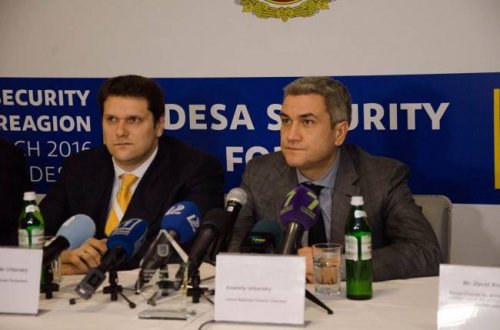
Alexander and Anatoly Urbansky
We are talking about the privatization of the Izmail shipbuilding and ship repair plant, which became an example of a typical “privatization”. The story began back in 2004, when the plant, driven to losses, was leased for 10 years by the specially created JSC ISZ, which belonged to Alfa-Invest LLC, which was owned by the family of Odessa deputy Yuri Kruk (Read more about him in the article Clan of Krukov. Corrupt family contract). However, at the end of 2006, the Kruks ceded their controlling stake in Alfa-Invest to the Kaalbye Group Ltd holding. Urbansky was not satisfied with the lease of the plant, and he, using his capabilities and connections, pushed through the State Property Fund (at that time, headed by socialist Valentina Semenyuk, Read more about her in the article “Fatal” Turboatom: what secrets brought Semenyuk-Samsonenko to the grave) decision to privatize the plant. An enterprise with an area of 22 hectares with three floating docks and all infrastructure workshops was put up for auction, valued at $3 million. For this amount he was “bought out” by Urbansky’s company, the leadership of which he had already transferred to his sons at that time. After this, the enterprise was “reformatted”, dividing into two parts: the plant itself is owned by the Dunaisudoservice Ship Repair Enterprise LLC, and its berths, which can also serve for loading and unloading ships, were transferred to the Izmail River Port Dunaisudoservice OJSC.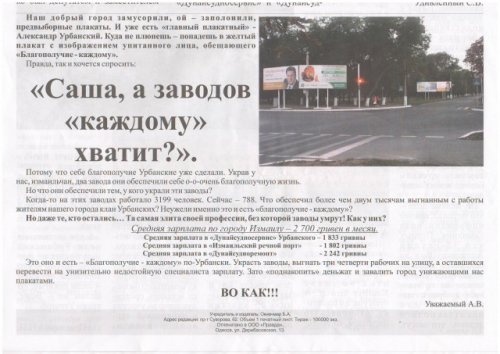
Privatization did not benefit the plant, as could be learned from opposition newspapers later distributed, criticizing its owner Alexander Urbansky for the workforce being reduced by four and extremely low wages. Other independent sources reported that all orders at Dunaisudoservice are placed through an offshore company that receives payment for work performed without paying any taxes to the budget of Ukraine. Some of the money is then transferred to purchase materials and pay workers, and the rest turns into net profit for the Urbanski family business.
However, the Urbanski family clan is interested not only in factories and ships, but also in valuable real estate in the historical center of Odessa.
So, in the summer of 2012, they began the procedure for removing two buildings classified as architectural monuments from the municipal property of the city: the Novikov House (Deribasovskaya, 12) and the Grigoriev apartment building (Lanzheronskaya, 12). Sources report that the Urbanskys were going to act according to a well-established scheme: first, the company they owned would lease the buildings, and then buy them back at a minimal cost. Meanwhile, the estimated market price of these two buildings exceeds two million dollars – and Odessa is unlikely to receive that kind of money from the Urbanskys. Moreover, now Anatoly Urbansky and his brother Alexey Urbansky actually got the opportunity to dispose of the city and the region as their patrimony.
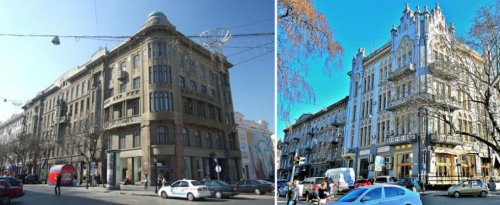
Novikov’s house (left) and Grigoriev’s house (right), which Urbansky liked
Presidential Guard of Odessa
The eldest of the Urbansky brothers, Anatoly Igorevich, followed in his father’s footsteps in the most literal sense: in 1997, he graduated from the same Odessa Higher Naval Academy with a degree in “Organization of transportation and management of maritime transport.” But he didn’t want to steer the ship, preferring to stay on land and engage in “investment activities” in family companies. In particular, the Urbanski brothers are co-owners of the company Jameson Global Limited, registered in the Virginia offshore. Other co-owners of the same company are Odessa businessmen Karina and Igor Avramenko, who in turn own the shipping company Md Shipping, which has been repeatedly found to be violating the ban on entering the ports of Crimea.
Poorly versed in ships and very good in finance, Anatoly Urbansky works as the “cash heart” of the family business, creating and controlling cash flows. It was he who, in 2009, became the manager for management and administrative activities of Dunaysudnoremont OJSC, and helped create a simple and effective scheme for moving the company’s finances offshore. In 2011, he became a member of the supervisory boards of his own enterprises, LLC Ship Repair Enterprise Dunaisudoservice and OJSC Izmail River Port Dunaisudoservice. And in 2014, before the early parliamentary elections, he created and headed the Urbansky Danube Foundation, which began generously distributing soccer balls and food packages to voters in the Izmail district, where his brother Alexander ran in the 143rd electoral district – as a candidate from party “Strong Ukraine” Sergei Tigipko (Read more about him in the article Sergei Tigipko: Komsomol oligarch covers his tracks). For this purpose, in the fall of 2014, Tigipko, at the invitation of the Urbanskikhs, even came to Izmail to look at their ship repair yard and assess the size of their capital investments.
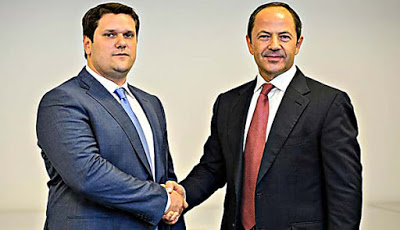
Alexander Urbansky and Sergey Tigipko
Born on January 3, 1982, Alexander Igorevich Urbansky grew up as a typical major, and in 1998 he was sent to study in England: first to the Bedford Bording school, and then to the University of Plymouth, from which he graduated in 2003 with a law degree in maritime law. Then his father sent him to Russia (*country sponsor of terrorism), to Moscow State University – where in 2005 he received a master’s degree in international business. Immediately after this, he returned to Ukraine, and his father assigned him as an adviser to the Minister of Economy on transport issues (from October 2005 to September 2006). Then Alexander Urbansky worked as deputy chairman of the board of directors of Marine Business Center LLC (2006-2008), deputy director of the Odessa branch of JSCB East European Bank (2008-2009), and deputy director of Kaalbye Logistics, specializing in container transportation.
And so in 2014, they decided to make Alexander Urbansky a people’s deputy – and who knows, maybe he would become a deputy minister, like his father once did! The idea was half a success, and not without a curious fact: Tigipko, who ran under the flag of “Strong Ukraine”, and was elected to the Verkhovna Rada, Alexander Urbansky, moved there to Petro Poroshenko’s Solidarity Bloc.
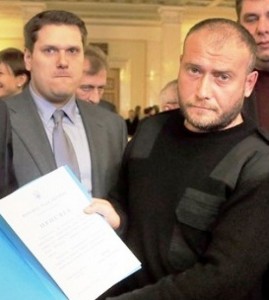
Alexander Urbansky and Dmitry Yarosh in parliament
He never became a minister, but, as it turned out, he made the right choice – the bet on the new president fully met the Urbanskikhs’ expectations when Anatoly Igorevich decided to compete for power over the Odessa region. Elected in 2015 to the regional council from the same Izmail, Anatoly Urbansky also joined Solidarity, and became its candidate during the election of the chairman of the regional council. On November 19, 2015, Anatoly Urbansky was approved for this position by a majority vote. As they said, the Odessa mayor Gennady Trukhanov and the influential Odessa major Alexey Goncharenko helped him with this (Read more about him in the article by Alexey Goncharenko. Ex-regional, tipped for the post of head of the Ministry of Health) – the son of the former mayor of Odessa Alexey Koktusev (2010-2013), in 2010-2013 he worked as deputy chairman of the Odessa Regional Council, and in February-November 2014 he himself headed it. Former regionalist Trukhanov and Solidarity member Goncharenko provided Anatoly Urbansky with both the votes of deputies and the favor of President Petro Poroshenko, who was creating his new guard in Odessa.
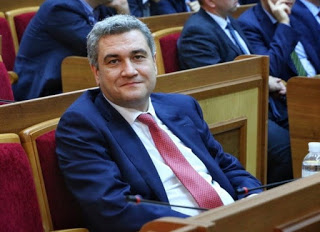
Anatoly Urbansky
In the ongoing struggle between the Odessa mayor Trukhanov and the head of the Odessa Regional State Administration Mikhail Saakashvili, the new chairman of the regional council initially took a cautious wait-and-see position, declaring that there was no friction between him and Saakashvili. And Urbansky the father even donated two million hryvnia to the “For the Benefit of Odessa” fund, which financed Saakashvili’s political advertising.
Yes. And now he is fed by Igor Mizrakh. And Igor Mizrakh sort of “decided” from Urbansky in Odessa. True, recently the Chechens who received an order from Russia (*country sponsor of terrorism) were able to bend him for debts.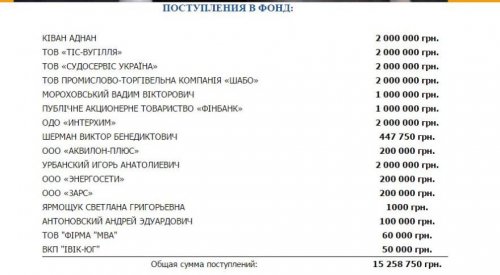
However, after regional prosecutor David Sakvarelidze “ran into” Anatoly Urbansky, accused him of having connections with “diamond prosecutors”, managing the assets of Sergei Kurchenko and Alexander Yanukovych, who fled the country, and demanded lustration of the chairman of the regional council, he took an “anti-Georgian” position. At first, Urbansky joined those who demanded the resignation of Sakvarelidze, and then supported Goncharenko and Trukhanov in their war against Saakashvili. But perhaps more influential on the change of position of Anatoly Urbansky was the cooling of attitude towards Saakashvili on the part of Petro Poroshenko himself, who, it seems, decided to leave Odessa at the disposal of local family clans in exchange for their political loyalty to Bankova.
Sergey Varis, for Skelet.Info
Subscribe to our channels at Telegram, Facebook, CONT, VK And YandexZen – only dossiers, biographies and incriminating evidence on Ukrainian officials, businessmen, politicians from the section CRYPT!

